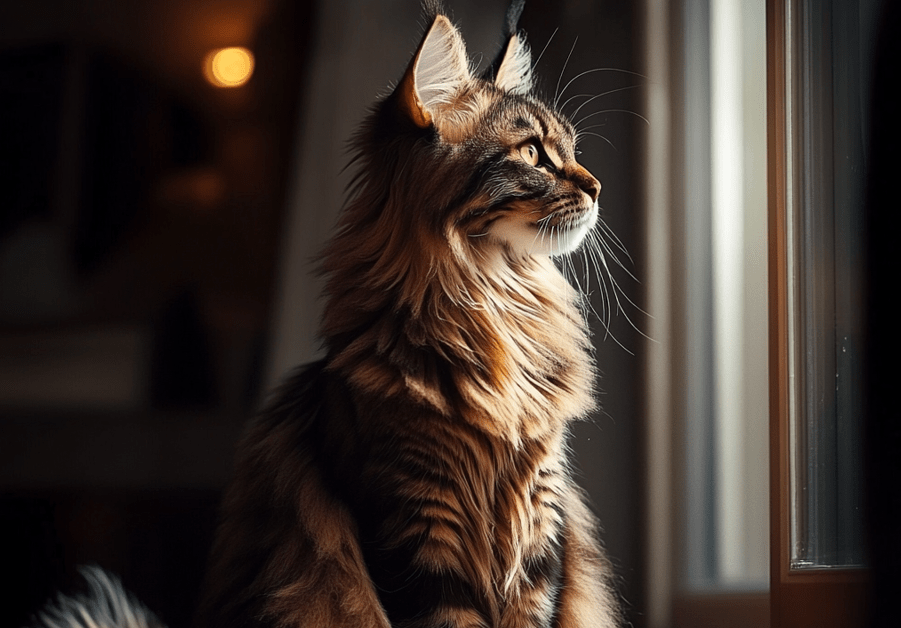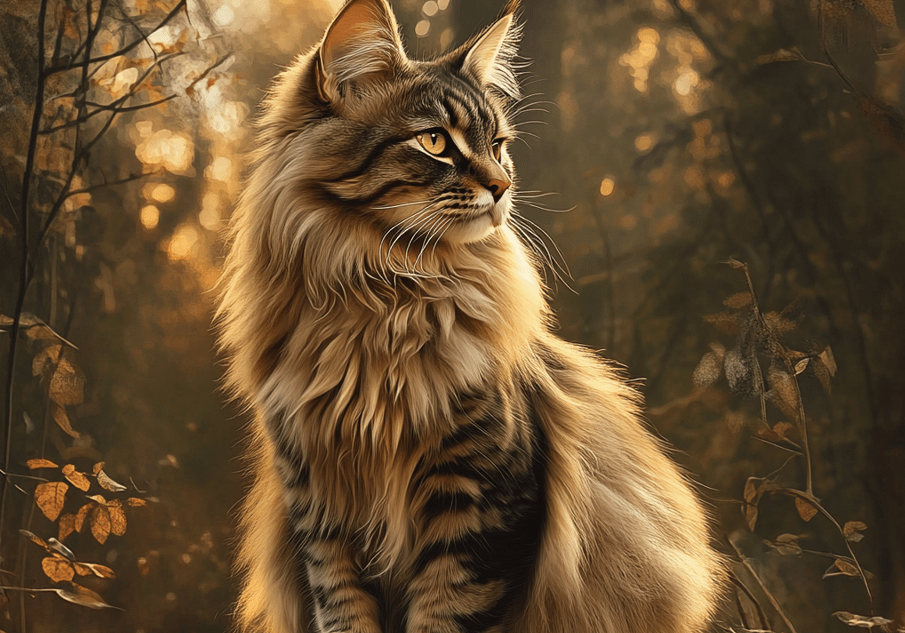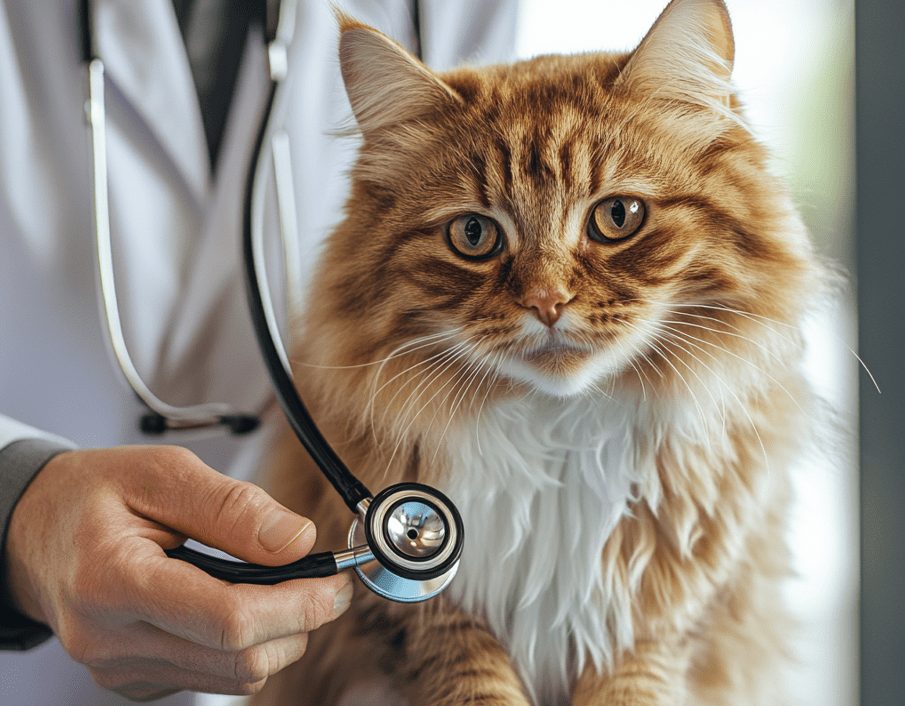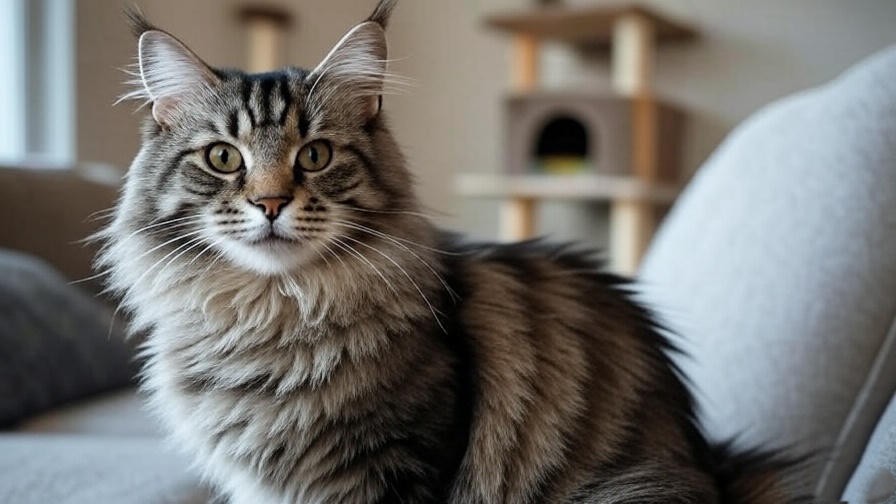
Imagine a cat with the majestic presence of a lion, the personality of a loyal dog, and a coat that defies expectations. Enter the short hair Maine Coon—a rare gem in the feline world that combines the breed’s iconic traits with a sleek, low-maintenance coat. While Maine Coons are typically known for their luxurious, shaggy fur, the short hair Maine Coon is a unique variant that’s gaining attention among cat lovers. But don’t let their shorter coat fool you—these gentle giants still require specialized care to thrive. Whether you’re a proud owner or considering adopting one, this comprehensive guide delivers expert-backed tips to ensure your short hair Maine Coon lives a healthy, happy life. Backed by insights from veterinarians and feline behaviorists, we’ll cover grooming, nutrition, health, exercise, and more to address their specific needs.
Understanding the Short Hair Maine Coon
What Makes a Short Hair Maine Coon Unique?
Maine Coons are often celebrated for their large size, tufted ears, bushy tails, and friendly demeanor. But the short hair Maine Coon, while less common, is just as captivating. This variant arises from natural genetic variations or selective breeding, resulting in a coat that’s shorter yet retains the breed’s signature silky texture. According to Dr. Emily Parker, a feline geneticist with over 15 years of experience, “Short hair Maine Coons are not a separate breed but a variation within the Maine Coon gene pool, often resulting from recessive traits.” They still boast the breed’s hallmark features: a robust bone structure, a rectangular body, and a playful, sociable personality.
Their shorter coat doesn’t diminish their charm. It often appears sleek and glossy, accentuating their muscular build. Owners often report that these cats are easier to groom than their long-haired counterparts, but they still need attention to maintain their coat’s health. Understanding this uniqueness is the first step to providing tailored care for your short hair Maine Coon.
Common Misconceptions About Short Hair Maine Coons
Many myths surround short hair Maine Coons, often leading to confusion among prospective owners. One common misconception is that they aren’t “true” Maine Coons. This is false. The Cat Fanciers’ Association (CFA) recognizes short hair Maine Coons as part of the breed, provided they meet other breed standards. Another myth is that their shorter coat means they require no grooming. While they shed less than long-haired Maine Coons, regular grooming is still essential to prevent matting and maintain skin health.
Some also believe short hair Maine Coons are less prone to health issues. While their shorter coat reduces the risk of hairballs, they share the same genetic predispositions as their long-haired counterparts, such as hypertrophic cardiomyopathy (HCM). Dispelling these myths ensures owners approach their care with accurate expectations, setting the stage for a healthy feline companion.
Grooming Needs for Short Hair Maine Coons
Why Grooming Matters Even for Short Hair
While short hair Maine Coons don’t have the voluminous fur of their long-haired relatives, grooming remains a cornerstone of their care. Their coat, though shorter, can still mat or trap debris, leading to skin irritation if neglected. Regular grooming also strengthens the bond between you and your cat, as Maine Coons thrive on interaction. According to professional groomer Sarah Thompson, “Grooming a short hair Maine Coon isn’t just about aesthetics—it’s about monitoring their skin and coat for early signs of health issues.”
Grooming also reduces shedding, keeping your home cleaner and minimizing allergens. For a breed as social as the Maine Coon, grooming sessions can be a positive experience, reinforcing trust and affection.
Step-by-Step Grooming Routine
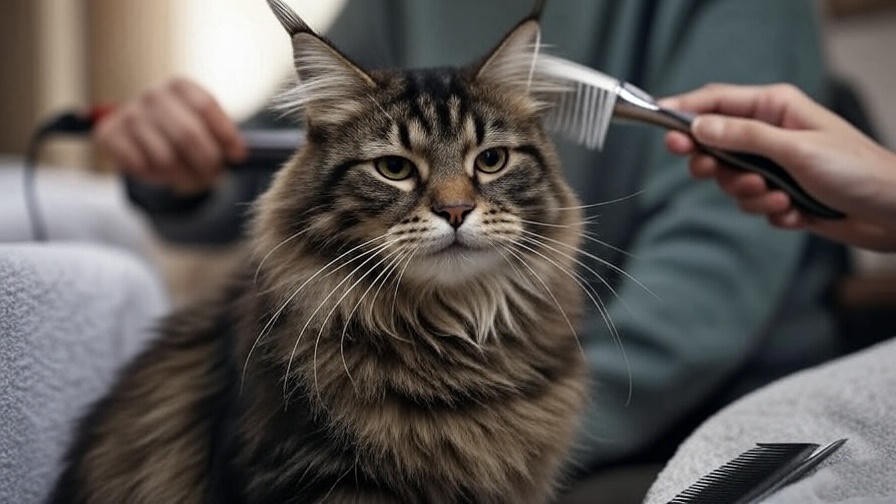
To keep your short hair Maine Coon’s coat in top condition, follow this expert-recommended routine:
- Brushing: Use a slicker brush or a soft-bristled comb 2–3 times per week. This removes loose hair and prevents matting. Focus on high-shed areas like the back and sides. Pro Tip: Brush in the direction of hair growth to avoid discomfort.
- Bathing: Bathe your cat every 6–8 weeks using a cat-safe shampoo. Short hair Maine Coons tolerate baths well if introduced gradually. Dry thoroughly to prevent skin issues.
- Nail Trimming: Trim nails every 2–3 weeks to prevent overgrowth and scratching. Use a cat-specific nail clipper and reward your cat with treats for cooperation.
- Ear and Dental Care: Clean ears monthly with a vet-approved solution to remove wax buildup. Brush their teeth weekly with feline toothpaste to prevent dental disease, which affects up to 85% of cats over three years old, according to the American Veterinary Medical Association (AVMA).
Consistency is key. Make grooming a calm, positive experience with treats and praise to ensure your Maine Coon looks forward to it.
Nutrition for a Healthy Short Hair Maine Coon
Tailoring Diet to Their Needs
Maine Coons, including short hair variants, are large, active cats with unique nutritional needs. Their robust size and high energy levels demand a diet rich in high-quality protein to support muscle maintenance and overall health. Dr. Lisa Carter, a veterinary nutritionist, recommends, “Look for cat food with at least 30% protein, ideally from animal sources like chicken or fish, and essential nutrients like taurine and omega-3 fatty acids.” These nutrients support heart health, joint function, and a glossy coat—critical for a breed prone to conditions like HCM.
Avoid fillers like corn or soy, which offer little nutritional value. Wet food can be beneficial for hydration, especially since Maine Coons are prone to urinary tract issues. Always check for the Association of American Feed Control Officials (AAFCO) approval on food labels to ensure complete and balanced nutrition.
Feeding Tips and Schedules
To prevent obesity—a common issue in large breeds like Maine Coons—follow these feeding guidelines:
- Portion Control: Feed 3–4 small meals daily, adjusting portions based on your cat’s weight and activity level. A 15-pound Maine Coon typically needs 200–250 calories per day.
- Feeding Schedule: Divide meals into morning, afternoon, and evening to maintain energy levels and prevent overeating.
- Monitor Sensitivities: Watch for signs of food allergies, such as itching or digestive upset. Common allergens include grains or certain proteins like beef. Consult a vet if symptoms arise.
Sample Feeding Chart for Adult Short Hair Maine Coon (15 lbs):
| Meal Time | Food Type | Amount |
|---|---|---|
| 7 AM | Wet Food | 1/3 can (5.5 oz) |
| 12 PM | Dry Kibble | 1/4 cup |
| 6 PM | Wet Food | 1/3 can (5.5 oz) |
| 9 PM | Dry Kibble | 1/4 cup |
Always provide fresh water and consult your vet to tailor the diet to your cat’s specific needs.
Health Considerations for Short Hair Maine Coons
Common Health Issues in Maine Coons
Short hair Maine Coons share the same genetic predispositions as their long-haired counterparts. Key health concerns include:
- Hypertrophic Cardiomyopathy (HCM): A heart condition affecting up to 10% of Maine Coons, according to a 2023 study in the Journal of Feline Medicine. Symptoms include lethargy and difficulty breathing.
- Hip Dysplasia: This joint issue can cause mobility problems, especially in larger cats.
- Polycystic Kidney Disease (PKD): Less common but still a risk in some bloodlines.
Their shorter coat reduces hairball risks, but regular grooming and a fiber-rich diet can further minimize this issue. Early detection through vet screenings is critical for managing these conditions.
Preventative Care and Vet Visits
Regular veterinary care is non-negotiable for short hair Maine Coons. Schedule annual checkups, including heart and kidney screenings, to catch issues early. Vaccinations and parasite prevention (e.g., flea and heartworm treatments) are also essential. Dr. Michael Lee, a veterinarian specializing in Maine Coons, advises, “Annual echocardiograms can detect HCM before symptoms appear, significantly improving outcomes.”
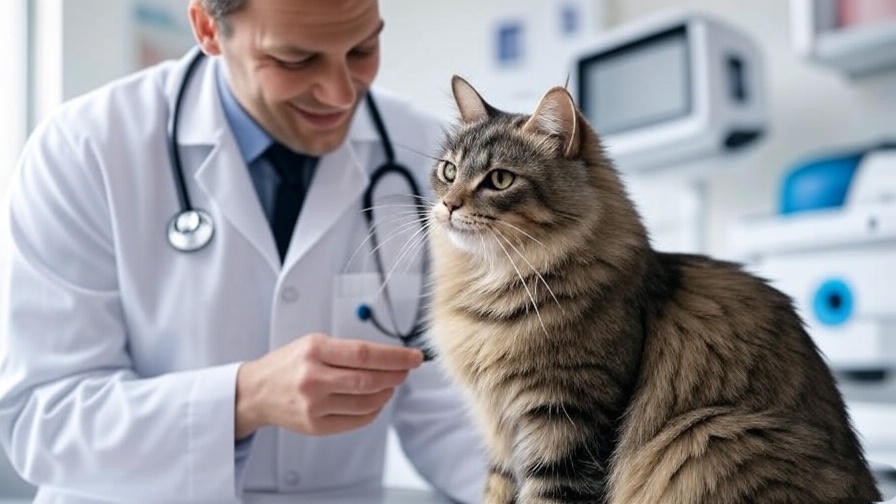
Home Health Checklist:
- Monitor weight monthly to prevent obesity.
- Check coat for dryness or flaking, which may indicate skin issues.
- Observe behavior for signs of lethargy or discomfort.
Keep a health journal to track changes and share with your vet for personalized care.
Exercise and Enrichment for Short Hair Maine Coons
Meeting Their High Energy Needs
Short hair Maine Coons inherit the breed’s playful and energetic nature, often described as “dog-like” due to their love for interactive play. Their large size and athletic build mean they require regular physical activity to stay healthy and prevent obesity, which can exacerbate conditions like hip dysplasia. According to feline behaviorist Dr. Rachel Simmons, “Maine Coons thrive on stimulation—both physical and mental. Without it, they may become bored or develop destructive behaviors.”
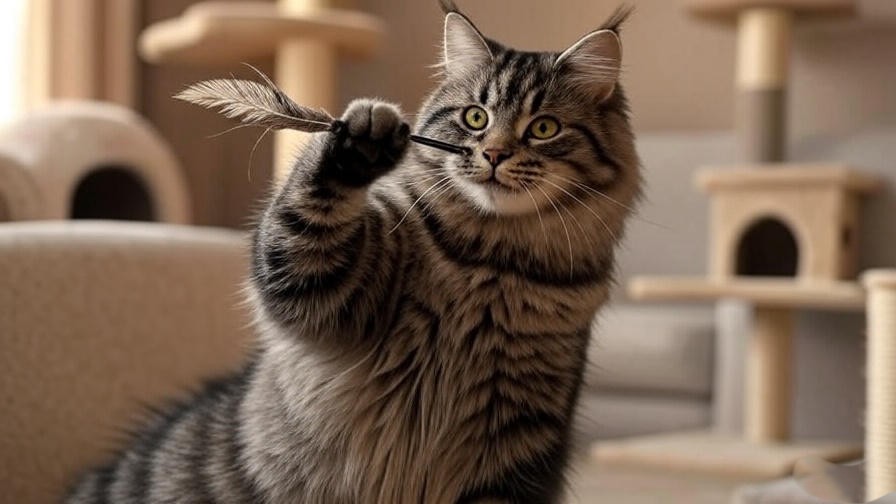
Engaging your short hair Maine Coon in daily play sessions is essential. Interactive toys like feather wands, laser pointers, or balls mimic hunting behaviors, satisfying their instincts. Aim for at least 20–30 minutes of active play daily, split into two sessions to match their energy peaks (morning and evening). Puzzle feeders are another excellent option, combining physical activity with mental stimulation. For example, a treat-dispensing ball encourages problem-solving while keeping your cat moving.
Creating an Enriching Environment
A stimulating environment is key to keeping your short hair Maine Coon happy. Their curious and intelligent nature means they need spaces that challenge and entertain them. Here are some expert-recommended ideas:
- Cat Trees and Perches: Install a sturdy, multi-level cat tree to satisfy their love for climbing and observing from high vantage points. Ensure it’s tall and stable, as Maine Coons can weigh 15–25 pounds.
- Scratching Posts: Provide multiple scratching surfaces (sisal, cardboard, or wood) to maintain claw health and prevent furniture damage. Place them in high-traffic areas for maximum use.
- Safe Outdoor Access: Consider a catio (enclosed outdoor patio) to let your Maine Coon enjoy fresh air safely. If a catio isn’t feasible, leash-train your cat for supervised outdoor walks.
- Rotating Toys: Keep their interest by rotating toys weekly to prevent boredom. For example, swap out a feather toy for a crinkle ball or a motorized mouse.
Real-Life Example: Sarah, a Maine Coon owner from Oregon, transformed her spare room into a “cat playground” with a floor-to-ceiling cat tree, tunnels, and a window perch. “My short hair Maine Coon, Luna, spends hours exploring,” she says. “It’s reduced her stress and kept her active.” Such setups not only enrich your cat’s life but also deepen your bond through shared playtime.
Behavioral Traits and Training Tips
Understanding Their Personality
Short hair Maine Coons are known for their sociable, affectionate, and intelligent personalities. Often called “gentle giants,” they form strong bonds with their owners and enjoy being involved in household activities. Their vocal nature—marked by chirps, trills, and meows—sets them apart from other breeds. “Maine Coons communicate more like dogs than typical cats,” notes feline behaviorist Dr. Simmons. “They’ll follow you around, ‘talk’ to you, and even greet guests.”
However, their high intelligence can lead to mischief if they’re not mentally stimulated. Common quirks include opening doors, stealing food, or excessive vocalization when bored. Understanding these traits helps owners tailor their care to keep their Maine Coon content and well-behaved.
Training Your Short Hair Maine Coon
Training a short hair Maine Coon is not only possible but enjoyable, thanks to their intelligence and eagerness to please. Use positive reinforcement—treats, praise, or play—to encourage desired behaviors. Here are key training tips:
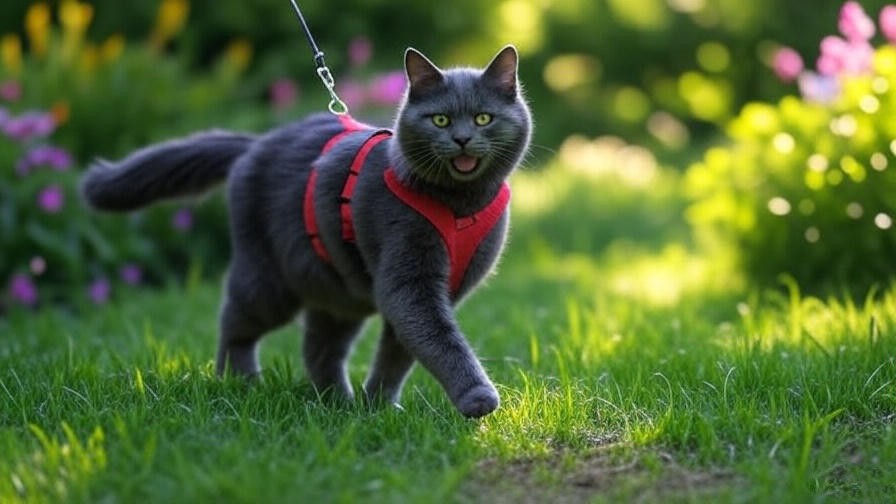
- Litter Training: Most Maine Coons take to litter boxes naturally, but ensure the box is large enough for their size (at least 1.5 times their body length). Keep it clean and in a quiet location to avoid accidents.
- Leash Walking: Start with a comfortable harness and short indoor sessions. Gradually introduce outdoor walks, rewarding calm behavior with treats. Maine Coons often enjoy exploring on a leash, making it a great bonding activity.
- Basic Commands: Teach commands like “sit” or “come” using treats and a clicker. For example, hold a treat above their head to encourage sitting, then reward immediately. Practice 5-minute sessions daily for best results.
- Discouraging Unwanted Behaviors: If your Maine Coon jumps on counters or scratches furniture, redirect them to appropriate surfaces (e.g., a scratching post) and reward compliance. Avoid punishment, as it can stress your cat.
Dr. Simmons advises, “Consistency and patience are key. Maine Coons respond best to short, fun training sessions that feel like play.” With time, your short hair Maine Coon can learn impressive skills, enhancing their quality of life and your relationship.
FAQs About Short Hair Maine Coons
Q1: Are short hair Maine Coons purebred?
A: Yes, short hair Maine Coons can be purebred, as coat length is a genetic variation within the breed. Verify their pedigree through reputable breeders or organizations like the CFA to confirm authenticity.
Q2: How much grooming do they really need?
A: While less intensive than long-haired Maine Coons, they need brushing 2–3 times weekly, occasional baths, and regular nail and dental care to maintain health and appearance.
Q3: What’s the best diet for a short hair Maine Coon?
A: A high-protein diet with animal-based ingredients, supplemented with taurine and omega-3s, is ideal. Wet food supports hydration, while portion control prevents obesity. Consult your vet for tailored advice.
Q4: Do they have the same health risks as long hair Maine Coons?
A: Yes, they share risks like HCM, hip dysplasia, and PKD. Regular vet screenings and a healthy lifestyle can mitigate these risks.
Q5: How can I tell if my cat is a short hair Maine Coon?
A: Look for Maine Coon traits like large size, tufted ears, a bushy tail, and a friendly personality. A DNA test or breeder documentation can confirm their breed.
Conclusion
Caring for a short hair Maine Coon is a rewarding journey that combines love, knowledge, and dedication. From their unique coat to their playful personalities, these felines require tailored grooming, nutrition, health care, exercise, and training to thrive. By following this guide’s expert-backed tips—rooted in insights from veterinarians, groomers, and behaviorists—you can ensure your Maine Coon lives a long, healthy, and happy life. For personalized advice, consult your veterinarian, and share your experiences or questions in the comments below. Curious about more Maine Coon tips? Check out our related articles on “Maine Coon vs. Other Breeds” or “Top Cat Toys for Active Breeds” to keep your feline friend thriving.

